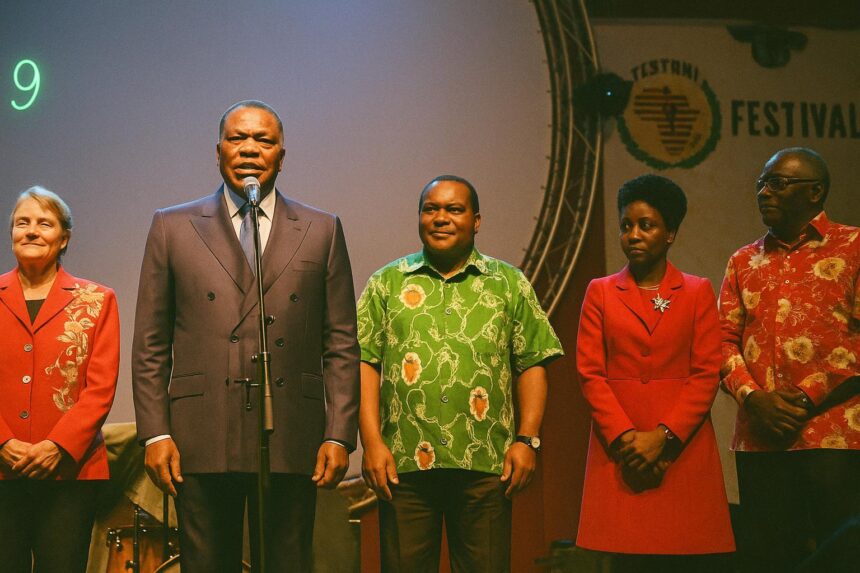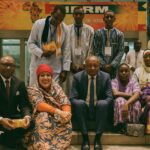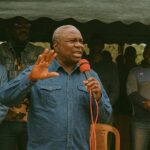Heritage Meets Innovation in Congo’s Capital
The soaring foyer of Brazzaville’s Palais des Congrès once again carries the timbre of balafons, Afrobeats and rumba. President Denis Sassou Nguesso, invoking the festival’s founding promise of continental fraternity, declared the 12th Pan-African Music Festival open on 19 July. His words signalled more than a ceremonial moment; they underlined Brazzaville’s intention to reassert itself as a cultural nerve-centre after the unavoidable postponements induced by the pandemic’s fiscal aftershocks.
- Heritage Meets Innovation in Congo’s Capital
- A Reduced Yet Resonant Pan-African Line-Up
- Cultural Diplomacy in an Era of Fiscal Prudence
- Economic Notes of the Digital Age
- Artistic Innovation Anchored in Rumba Legacy
- Security and Public Health Considerations
- Prospects Beyond the Closing Chord
- A Measured Ovation
A Reduced Yet Resonant Pan-African Line-Up
Only fourteen delegations answered the 2025 call, a modest figure compared with the thirty-plus nations present at earlier editions. The lean roster, acknowledged by Commissioner-General Hugues Ondaye, was framed not as a setback but as an exercise in strategic curation. Ensembles from Cameroon, South Africa, Ghana and Cape Verde shared the bill with emerging Congolese icons, ensuring that each showcase benefited from prime scheduling, reduced logistical congestion and enhanced media visibility (Agence Congolaise d’Information, 19 July 2025).
Cultural Diplomacy in an Era of Fiscal Prudence
The Congolese treasury, like many across the continent, continues to navigate the delicate arithmetic of post-covid recovery and hydrocarbon price volatility. Within those parameters, funding a festival might appear counter-intuitive. Yet diplomats interviewed on the sidelines of the opening gala emphasised the lasting value of soft-power dividends. An EU envoy noted that FESPAM ‘functions as a rehearsal space for dialogue; it is easier to negotiate about security or climate financing after one has applauded the same orchestra’. The presence of more than twenty ambassadorial corps underlined a shared belief that music can moderate political dissonance.
Economic Notes of the Digital Age
The 2025 theme, ‘Music and Economic Stakes in Africa in the Digital Era’, reflects a sector undergoing rapid mutation. According to the International Federation of the Phonographic Industry, sub-Saharan streaming revenues grew by 24 per cent in 2024, outpacing every other region. Minister of Culture Lydie Pongault used her keynote to advocate national legislation that would secure fair remuneration for creators while attracting foreign platforms. The ministry’s policy paper, circulated to delegations, estimates that a one-point rise in digital music market share could add 0.2 percentage points to Congo’s non-oil GDP within three years.
Artistic Innovation Anchored in Rumba Legacy
Congo’s urban rumba, inscribed by UNESCO as Intangible Cultural Heritage in 2021, remains the festival’s spine. Yet this year’s programming juxtaposes heritage with algorithmic creativity: Nairobi-based producer Jinku premiered an AI-assisted soundscape sampling archival recordings from Franco Luambo, while Congolese start-up MuntuMusic demonstrated a blockchain platform for rights management. The interplay between ancestral rhythms and frontier technologies illustrated the festival’s ambition to keep Africa’s musical passport future-ready.
Security and Public Health Considerations
The government announced a multilayered safety protocol, blending biometric accreditation for performers with rapid antigen testing for staff. Observers from the African Union’s Centre for Disease Control praised the arrangement as ‘proportionate and replicable’, particularly since several participating states remain vigilant against resurgent viral strains. The relatively compact attendance facilitated compliance, adding reputational value to Brazzaville’s wider campaign to present itself as a conference-ready hub.
Prospects Beyond the Closing Chord
While the festival’s budgetary contours remain discreet, early hospitality data suggest a 35 per cent uptick in hotel occupancy compared with July 2024, according to the Congolese Tourism Board. Negotiations are under way with the African Export-Import Bank to establish a revolving credit line for creative industries, potentially linking future FESPAM editions to a wider ecosystem of fashion and film. Analysts at the University of Kinshasa predict that, should streaming penetration continue its upward trajectory, Congo-Brazzaville could position itself as a rights-management hub for Central Africa within the decade.
A Measured Ovation
The 12th edition may lack the sheer numerical exuberance of earlier gatherings, yet its symbolic amplitude is undiminished. By curating a festival that foregrounds economic pragmatism, digital opportunity and cultural continuity, Brazzaville articulates a vision in which artistic expression and macroeconomic planning are no longer discrete pursuits. As the final notes echo across the Congo River, policymakers and performers alike seem attuned to a shared refrain: sustainable development, like music, thrives on harmony, modulation and, above all, attentive listening.




















